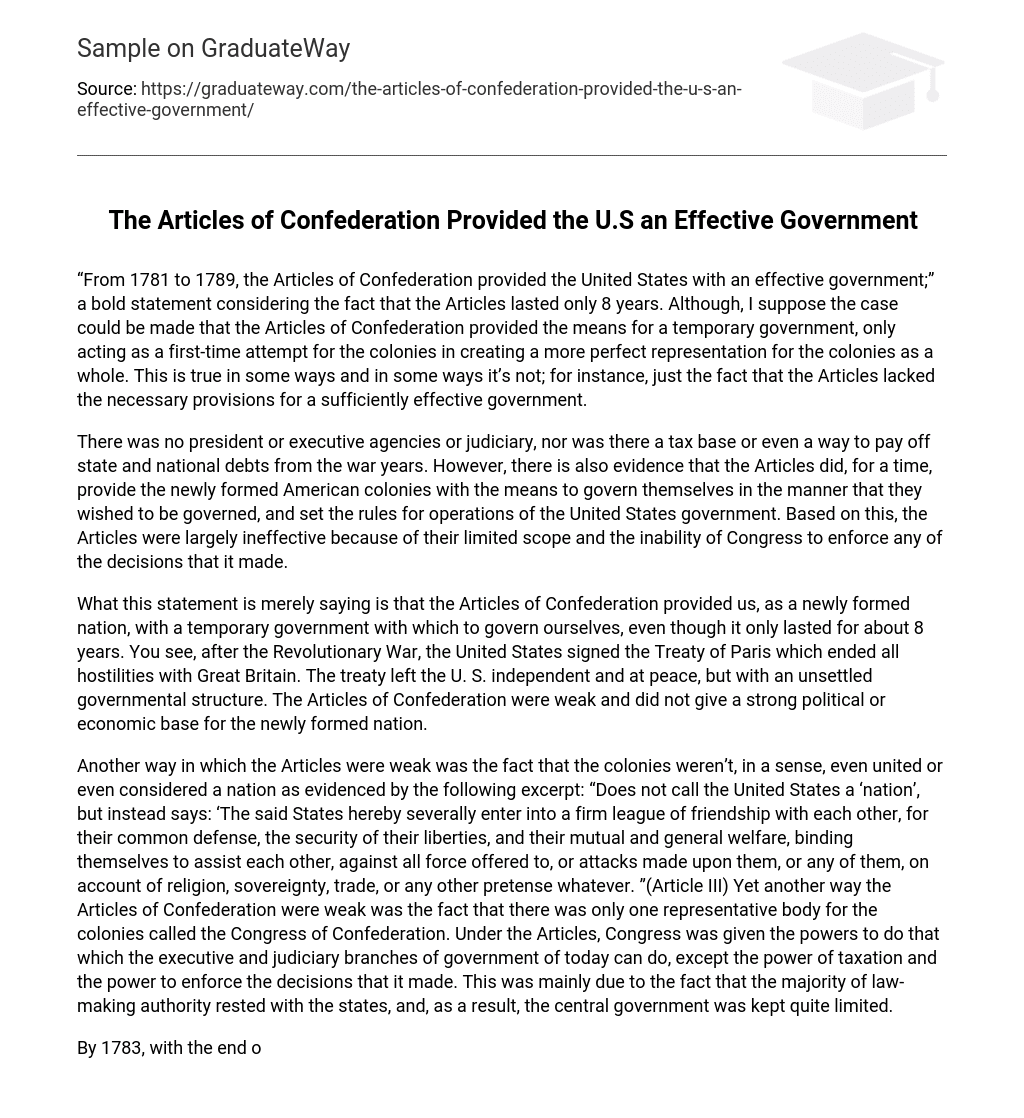While the Articles of Confederation functioned as the United States’ government from 1781 to 1789, some argue that they were designed to be temporary and represented the initial effort of unity among the colonies. However, it is crucial to acknowledge that the Articles lacked vital provisions for an effective government.
Despite the absence of a president, executive agencies, or a judiciary, the Articles of Confederation provided self-governance in the American colonies and set regulations for the US government. However, they had limitations since they did not include provisions for taxation and debt repayment, and Congress lacked enforcement power for its resolutions.
The main goal of the Articles of Confederation was to establish a temporary government for the newly formed United States. This government, lasting about 8 years, became essential after the Treaty of Paris ended hostilities with Great Britain and granted independence to the U.S., leaving the nation without a stable governmental structure. However, the Articles of Confederation were inadequate in creating a strong foundation for politics and economics in the recently established country.
The weaknesses of the Articles of Confederation are evident in various ways. Firstly, instead of being considered a nation, the colonies were not united. This is illustrated by the following excerpt: “Does not call the United States a ‘nation’, but instead says: ‘The said States hereby severally enter into a firm league of friendship with each other, for their common defense, the security of their liberties, and their mutual and general welfare, binding themselves to assist each other, against all force offered to, or attacks made upon them, or any of them, on account of religion, sovereignty, trade, or any other pretense whatever.” (Article III)
Another weakness was that there was only one representative body called the Congress of Confederation for the colonies. Although Congress had powers similar to today’s executive and judicial branches , it lacked authority in taxation and enforcement . This limited power stemmed from most law-making authority residing with the states.
In summary , these weaknesses emphasize both the fragmented nature of the colonies under the Articles of Confederation and the restricted authority of the central government.
In 1783, the new nation successfully surpassed the British blockade and experienced an economic revival. However, trade opportunities were limited due to mercantilism policies enforced by both the British and French empires. Additionally, political unrest in various states and attempts by debtors to exploit the democratic government raised concerns among the wealthy class that had played a significant role in the Revolution. The lack of progress by Congress in meeting post-war financial obligations, as well as its failure to promote collaboration between states for economic growth, worsened an already bleak situation.
During the time of Shay’s Rebellion in 1786-87, an uprising of farmers in western Massachusetts against the state court system endangered the stability of the state government. Despite being an ambassador to France, Thomas Jefferson did not panic about Shays’ Rebellion. In a letter to a friend, he argued that periodic rebellions can be beneficial, stating, “The tree of liberty must be refreshed from time to time with the blood of patriots and tyrants. It is its natural manure.” In contrast, George Washington, who was advocating for a stronger national government through the union of states in his letters, wrote to Henry Lee about the rebellion. He expressed doubt about the effectiveness of influence in calming the unrest and emphasized the need for a government that truly protects lives, liberties, and properties. This conflict became a turning point in the legacy of the Articles of Confederation and ultimately led to a reconsideration of the document itself in 1787.In the end, the rebellion was the culmination of a sequence of occurrences during the 1780s. These events persuaded a influential faction of Americans that the central government had to be more robust in order to establish consistent economic strategies and defend property owners against encroachments on their rights by local majorities.
The Articles of Confederation were deemed ineffective due to their limited scope and Congress’s inability to enforce decisions. Although the Articles were groundbreaking in theory, events in the 1780s revealed that they fell short of expectations.





